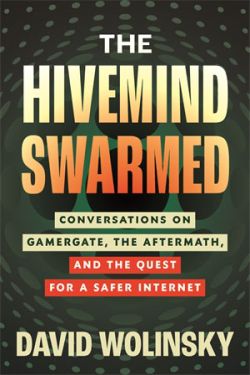 We’re ten years out from the online harassment campaign that came to be known as “Gamergate” and I’ve still never been able to wrap my head around the idea that some people thought a torrential barrage of death and rape threats was an appropriate response to writing about video games in a way they didn’t like. The creator of the Don’t Die interview series, David Wolinsky, was similarly baffled by Gamergate, and he recently spoke to a number of “major figures in gaming, tech, media, and politics” to get the real story behind the hashtag.
We’re ten years out from the online harassment campaign that came to be known as “Gamergate” and I’ve still never been able to wrap my head around the idea that some people thought a torrential barrage of death and rape threats was an appropriate response to writing about video games in a way they didn’t like. The creator of the Don’t Die interview series, David Wolinsky, was similarly baffled by Gamergate, and he recently spoke to a number of “major figures in gaming, tech, media, and politics” to get the real story behind the hashtag.
Wolinsky’s The Hivemind Swarmed: Conversations on Gamergate, the Aftermath, and the Quest for a Safer Internet is an oral history of Gamergate, but it’s also an examination into how the harassment campaign later influenced the alt-right movement:
An incisive oral history that brings together the voices of major figures in gaming, tech, media, and politics to reflect on the long shadow of Gamergate
With The Hivemind Swarmed, oral historian and documentary researcher David Wolinsky invites readers to sit in on a series of urgent, intimate conversations between some of the most distinguished voices across entertainment industries and media as they reflect on the longstanding impact of Gamergate. What went wrong, and what can we learn from Gamergate to help us build a more equitable online world?
The backstory: 10 years ago, a disgruntled software developer named Eron Gjoni posted online to accuse his ex-girlfriend, game developer Zoë Quinn, of sleeping with game critics in exchange for positive reviews. He offered no evidence to back up his claims. However, his posts were picked up by extremists in the gaming community who built a vicious online movement targeting women, minorities, and progressive voices. Rallying under the hashtag #gamergate, they sent their victims round-the-clock death and rape threats. Game companies, for the most part, declined to take action as their female employees were harassed out of their jobs. The FBI launched an investigation but found “no true threat.”
Gamergate holds the grim distinction of being the first modern online harassment campaign. It arguably served as a model for the alt-right movement that would help propel Donald Trump to the White House. And it highlighted a toxic media culture—not just in gaming, but in film, TV, journalism, and more—in which leaders, through their passivity, took the side of the oppressor. Now, 10 years later—in the wake of #MeToo, Charlottesville, the Trump years, and the January 6 insurrection—the questions discussed here are more important than ever.
The Hivemind Swarmed: Conversations on Gamergate, the Aftermath, and the Quest for a Safer Internet was recently published by Beacon Press and it’s available in bookstores now.

